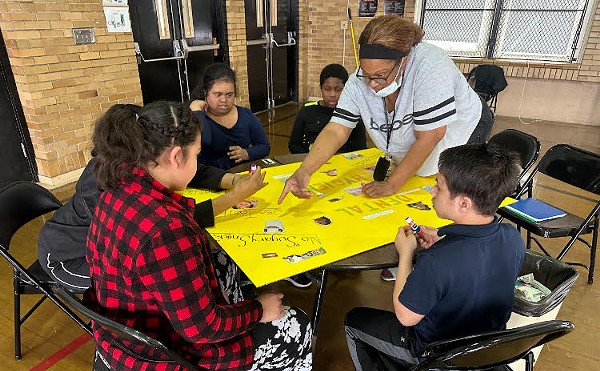Correction
A music preview in last week’s edition should have said Tim Krekel’s wedding reception took place at The Rudyard Kipling. LEO regrets the error.
Love Tsunami
On Sunday, Nov. 14, one of the most amazing moments of my life occurred at the River Bend Winery: A few hundred folks from our community, including many local artists, gathered in response to rising costs associated with my current major health issue, congestive heart failure. The result was a “love tsunami” marked by deep affirmation and generous financial support.
On that day, I experienced a gathering of beautiful people who represent my entire life history. Thank you for letting me share my songs and my words with you over the years, and, when things got rough and my treatment options began to narrow, thank you for surrounding me with profound levels of healing love.
Your outpouring of generosity and care is not in itself surprising, because I have seen you reach out to help others so many times. The magnitude of your response is, however, nothing short of amazing and is a testament to what we can achieve when our hearts are aligned. This was a defining moment for all of us who value strong community and the gift of love.
I look forward to a successful two-to-three-year process to resolve my health issues. I also look forward to continuing to serve humbly and with deep commitment one of the greatest communities anywhere.
My sincere thanks to the artists who came bearing the gift of music. Thanks to River Bend Winery for opening their doors and hearts for this event. Thanks to the media for helping get the word out. Thanks to the Homefront dream-keepers and others who worked so hard to coordinate all the logistics. Thank you, Louisville, for being the kind of people who rise to the highest levels of love and who reach out to those in need over and over again. I am proud to be a part of this community and to pursue my life work among you. Thanks to you, I hope to continue that pursuit for many years to come. God bless you all.
John Gage, Original Highlands
Censored Project
Reading about the top 10 underreported stories for Project Censored (LEO Weekly, Dec. 1), it is obvious that Project Censored also has an agenda. No human rights abuses on the part of Hamas and Hezbollah were considered noteworthy, such as the rape of European human rights activists by members of Hamas, the targeted murders of Palestinians if they show any desire for peace, and the seizure of most of the goods intended for their own impoverished citizens. Maybe it’s because it’s not fashionable to do anything but single out Israel and accuse it (incorrectly) of behaving in an apartheid manner while ignoring human rights abuses by dictatorships such as Hamas.
Aviv Naamani, Highlands
No Transparency
I have some comments regarding last week’s letter from Marvin Lazaro condescending and righteously sermonizing LEO writer Jonathan Meador and editor Sarah Kelley.
I find that one of the most refreshing elements of LEO is that there is not a ridiculously transparent cloud of secrecy behind the values or feelings of the writers. For a contrast, look to Dan Klepal’s “hit piece” in The Courier-Journal on Hal Heiner’s past marriage, just a few days before the general election. Was the C-J and/or Klepal inherently biased in their reporting due to the C-J’s endorsement of Greg Fischer? Unfriggingdoubtedly. Was that bias disclosed in the story? (Crickets rolling their little eyes.) Would that disclosure have given the story a needed perspective to the casual reader that may have swayed the election? Um, duh.
Meador is an amazing writer, and I’d continue to enjoy learning news from his perspective, even if he was forced to censor it to appease Lazaro’s passion for protecting an obsolete style of paternalistic journalism. I certainly hope it won’t come to that. The best is yet to be.
Curtis Morrison, Highlands
Useless Nuts
I am heartened by the renewed use of the chestnut in American cooking (LEO Weekly, Nov. 24), however, the nuts described by Summer Auerbach in her recent Locavore Lore article on the return of the chestnut are not American chestnuts (Castanea dentata). In addition, I’d like to caution readers that the nuts pictured are the toxic horse chestnuts (Aesculus hippocastanum), commonly called the “buckeye,” which is not a member of the chestnut family.
Unfortunately, the American chestnut is not in the midst of a “triumphant return.” American Chestnut Foundation genetic crosses of American chestnuts are still in trials. The level of resistance in the most promising crosses isn’t yet fully known. No blight-resistant American chestnut trees or their nuts are commercially available. The species is still functionally and economically extinct. Many people believe they have American chestnut trees. Usually the trees are Chinese or European chestnuts or hybrids of the Chinese/Japanese/Korean and European chestnuts. With continued research, a blight-resistant American chestnut may again be a viable species in our forests and nut orchards. Consult the American Chestnut Foundation for the most accurate information at www.acf.org.
Richard J. Spalding, The Garden Artisan, Audubon Park
Open-Mindedness Wins
I feel compelled to answer Joseph Vap’s answer to my letter as published in LEO (Nov. 17 issue). But first I want to thank LEO for publishing my original letter. Too often, I think, I see letter after letter from Tom Louderback and Paul Whiteley Sr. and other regulars, so I appreciate you offering my opposing position in print. As an open-minded conservative who seeks out opinions and thoughts that differ from my native ones (as evidenced by my frequent reading of your publication), it is refreshing to see debate. I find that I often learn and moderate my perspective after reading those that vary from my own. I hope your typical liberal readership employs the same open-minded approach to life.
In regard to Vap’s letter, I’d suggest he re-read mine. My letter (except perhaps between the lines) was not an anti-tax rant. I personally don’t feel qualified to weigh in on whether lower tax rates will really spur the economy enough to raise revenue (as Limbaugh and others often proclaim), or whether higher tax rates will or will not stifle the economy enough to lower gross revenues. Those arguments are left to those with far greater economic insight than I possess.
No, Mr. Vap, my letter was in regard to electoral language. Words matter, and when used incorrectly (IMO) over and over, they burn into people’s minds that they are correct. Hence, we come to believe wealth = income and “voting in one’s interest” is axiomatically correct and a measure of one’s intelligence. And further, such approaches to campaigning spoil the atmosphere so that our leaders cannot openly debate real alternative solutions to the major economic issues, such as how to fund long-term Medicare and Social Security, without having their words twisted to make our seniors (and others) believe they are about to be abandoned in the cold winter streets.
I give as example Rand Paul’s comments on larger deductibles for Medicare being the real solution. That was an honest opinion and a truly viable solution. High-deductible health plans are a great way to control costs — they make one think before engaging health providers. But the way Paul’s words were portrayed in Conway’s ads, such real-life solutions can’t even be debated; and as I stated above, real, honest, open-minded debate is what we need from both sides of the political spectrum.
?Bob Hogan, New Albany
Chicken, Egg or Pizza?
In response to Heather Moore’s Nov. 24 citation of unnamed research purporting to show, in part through analysis of ancient Egyptian mummies, that “cancer is caused by” modern factors, “including diet,” a few points cry out to be made.
1) Infant mortality rates in ancient Egypt were about 60 percent. The life expectancy of those who had made it through infancy was about 40 years.
2) Most people stricken with cancer are probably over age 40. The probability of getting cancer increases with age. Ergo (wink), longevity causes cancer.
3) One of the main causes of death in ancient Egypt, even among the wealthy, was malnutrition.
So it seems the modern diet may help cause longevity, which in turn causes cancer. Excuse me, the doorbell rang, my Meat Lover’s Pizza is here.
Rich Mills, Shawnee





